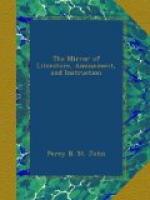blood rushed to my heart—and, shuddering,
I started on my feet, felt no fatigue, knew of no wound,
and joined my party. I had not seen this flower
for ten years! but it probably saved my life—an
European officer, wounded and alone, might have tempted
the avarice of some of the numerous and savage followers
of an Indian army. In the cooler and calmer hours
of reflection since, I have often thought that this
appearance was a mere phantom, an illusion—the
offspring of weakness: I saw it but for a moment,
and too imperfectly to be assured of reality; and
whatever I believed at the time seems now to have
been a painting on the mind rather than an object
of vision; but how that image started up. I conjecture
not—the effect was immediate and preservative.
This flower was again seen in Spain: I had the
command of an advance party, and in one of the recesses
of the Pyrenees, of the romantic, beautiful Pyrenees,
upon a secluded bank, surrounded by a shrubbery so
lovely as to be noticed by many—was a
cowslip.
It was now nearly twenty years since I had seen it
in Mysore: I did not start; but a cold and melancholy
chill came over me; yet I might possibly have gazed
long on this humble little flower, and recalled many
dormant thoughts, had not a sense of duty (for we
momentarily expected an attack) summoned my attentions
to the realities of life: so, drawing the back
of my hand across my eyes, I cheered my party with,
“Forward, lads,” and pursued my route,
and saw it no more, until England and all her flowery
meadows met my view; but many days and service had
wasted life, and worn the fine edge of sensibility
away; they were now before me in endless profusion,
almost unheeded, and without excitement; I viewed
not the cowslip, when fifty, as I had done with the
eyes of nineteen.
* * * *
*
THE CHRISTMAS BOX.
This is the happiest title in the whole list
of annuals. There is nothing sentimental or lachrymose
in it; but it is warm and seasonable, and done up
in a holly-green binding, it is all over old Christmas.
The first story in the volume is Old Christmas; one
of the gems or sweets is Garry Owen, or the Snow-Woman,
by Miss Edgeworth, for it abounds with good sentiment,
just such as we should wish in the hearts and mouths
of our own children, as a spice for their prattle.
We pass over L’Egotiste Corrigee, par
Madame de Labourt—pretty enough—and
the Ambitious Primrose, by Miss Dagley. Then a
Song, by Miss Mitford; and a Story of Old Times, by
Mrs. Hofland; and the Tragical History of Major Brown,
a capital piece of fun; and Pretty Bobby, one of Miss
Mitford’s delightful sketches. The Visit
to the Zoological Gardens is not just what we expected;
still it is attractive. Major Beamish has accommodated
military tactics to the nursery in a pleasant little
sketch; and the proverb of Much Coin Much Care, by
Mrs. R.S. Jameson is a little farce for the same
stage.




